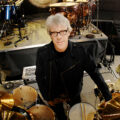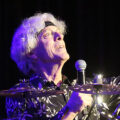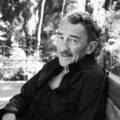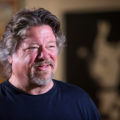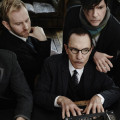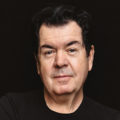Guitarist/author Andy Summers sends a multi-media “Message In A Bottle” to North Shore
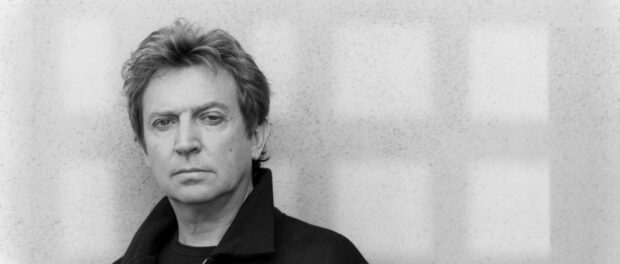 Photo by Dennis Mukai
Photo by Dennis Mukai
Everyone knows Andy Summers as the game-changing guitarist for The Police, who alongside Sting and Stewart Copeland, came out swinging like reggae-fueled punk rockers in the late 1970s, followed by total mainstream domination throughout the 1980s and a stadium-sized reunion in the 2000s.
In between, the Rock and Roll Hall of Famer made a mound of movie soundtracks and solo albums, while diving deeper into literature and photography, right up to his current short stories collection, “Fretted And Moaning,” plus the art book “A Series Of Glances.”
All of those worlds are finally going to converge at the North Shore Center For The Performing Arts on Friday, September 8 during the “The Cracked Lens + A Missing String” Tour, a multi-media journey centered around innovative guitar improvisations.
Chicago Concert Reviews reached Summers, now 80 but coming across much younger, for a rare interview about the unique undertaking, insight into each artistic discipline, and of course, what it was like being in the band that birthed “Message In A Bottle,” “Every Breath You Take,” “Roxanne” and tons of other multi-million sellers.
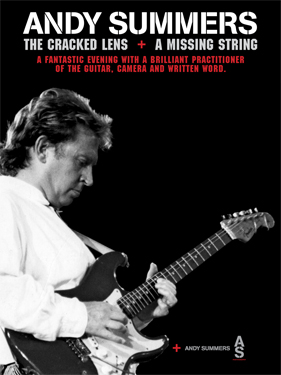 What’s in store for this show?
What’s in store for this show?
Andy Summers: I guess you’d call it multi-media or audio visual. It’s not just a band or playing a guitar. I’m performing solo electric guitar. We do all these projections onto a cinema-sized screen, all sorts of photographic sequences that I’ve made all over the world. Some are with backing tracks. Some are solo. All sorts of things, so that’s what it is.
It’s been quite a while since you’ve come to the Chicago area. Can you recall your last performance here?
Summers: I can’t remember where I’ve played last. I mean, I’ve played there a few times over the years, obviously with The Police, but of course there was this thing called the pandemic that put a hole in everything for three years. This is finally the return.
You’ve had quite a prolific career, so what’s your criteria for fitting this all into the show? Do you have a predetermined plan or is it all a spontaneous flow?
Summers: No, you can’t do it like that. It’s too technical. It’s not spontaneous. I mean, the spontaneous part is I’m playing completely improvised guitar solos all night long, so you’re going to get a full on guitar show from me. No, we have to work it out because I’ve got very specific film sequences and then I’m playing a certain kind of guitar style for that, depending on which part of my equipment I want to run it through, the sound of guitar, which is very important. It’s almost like the compositions are made from the guitar effects I’m using…No, it’s a very strict set and it has to be because its in the computer. Once it’s in to run that way, you can’t really change it, but within those pieces, of course, I am actually making it all up on the spot.
The surprising thing is, cause I’ve been doing this for a while, that I didn’t do it earlier on [other then when] I was doing it pre-pandemic. [I thought] I should stick photography and music together on stage, and I did about ten shows. I ended up at The Metropolitan Museum Of Art in New York, which was pretty fancy and that sold out, and then the pandemic took over. So meanwhile, we’ve had this sort of three years off and I didn’t think about it much, wondering when we were going to be able to go out again. Now the time has come, things have changed, so we’ve been able to sort of smarten the show up a bit because technical things have happened that we didn’t have before. I think we’ve made a punchier, slicker show where it runs better than my first one out, which was pretty simple. I’m looking forward to seeing how it goes now because I think we’ve got a better show all together than we had.
During the time of the break, you released “A Series Of Glances.” What were you aiming for conceptually and thematically when you were putting that project together?
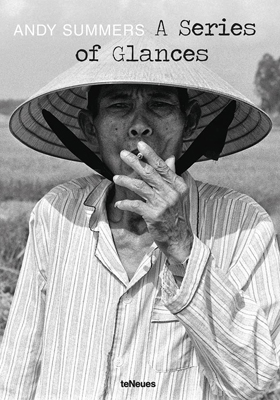 Summers: You could say, very broadly, good photography (laughs). That book is almost like, you know, not a career ender. I’ve still got another one coming already, but a sort of summing up a lot of photography I’ve done around the world over the years. Some of those pictures are really quite old, but they’re from all over the world: India, Japan, Tibet, China, all over the place. It’s almost kind of like a greatest hits, but there’s traction from there as well. I’m very pleased with the production of the book. It came out beautifully. I’m very pleased that [the book publishing company] teNeues did that with me. I’ve done photography shows with it, normal exhibitions. I had a camera made with my name on it by Leica. We did a big one the summer before. It’s healthy. I would say I have about as much [of a] photography career as I want to enjoy.
Summers: You could say, very broadly, good photography (laughs). That book is almost like, you know, not a career ender. I’ve still got another one coming already, but a sort of summing up a lot of photography I’ve done around the world over the years. Some of those pictures are really quite old, but they’re from all over the world: India, Japan, Tibet, China, all over the place. It’s almost kind of like a greatest hits, but there’s traction from there as well. I’m very pleased with the production of the book. It came out beautifully. I’m very pleased that [the book publishing company] teNeues did that with me. I’ve done photography shows with it, normal exhibitions. I had a camera made with my name on it by Leica. We did a big one the summer before. It’s healthy. I would say I have about as much [of a] photography career as I want to enjoy.
You’ve also become quite an accomplished written author as well. Where did that inspiration initially come from and can you give us a glimpse of “Fretted And Moaning?”
Summers: I’m a person who likes to read. I’m a totally avid reader and have been since I was about three-years-old. I’ve never stopped reading and taking in literature of every stripe. The first one I did was “One Train Later,” which was an autobiography, my life in music kind of thing, including The Police. That was a very successful book, so it’s encouraging. The last full on book I had was “Fretted And Moaning,” which is all short stories and most of them include a guitar somehow, but it’s not really about the guitar at all. It’s about having a life with the people around it, so that’s been out for about two years now and we’ll be selling it at the shows. I’ve got another one in the works with the same publisher, and currently, “A Series Of Glances” is out, so it’s a pretty full life between doing all those things, but that’s who I am. I’m also moving on to the next possible project. We’ll see if I can actually do some of it. I’ve got some ideas for a graphic novel (laughs). I’m thinking about it. I’ve got the story. I’m re-writing the story, checking it, but it involves Japan. It dawned on me somewhere within there, “Oh, I want a graphic novel. Do it that way.”
Are you still composing for films?
Summers: I did do that for a bit. I kind of enjoyed doing it to a degree. Mostly, what I didn’t enjoy about it was Hollywood business, which was really reprehensible. I didn’t like dealing with the people very much, and the same time I was doing it, I was making my own solo records and composing everything for my own records. That was much more interesting to me and that’s where I stayed when I stopped doing film scores. I mean, I could do them in my sleep. I’m amazed at what gets on the screen, worse things these days. Yeah, you’ve got to be very dedicated if you want to stay in it business wise. Difficult.
Going back even further, what are the most pivotal parts of The Police’s story that stand out in your mind?
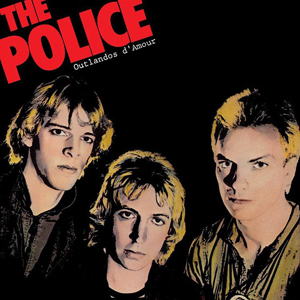 Summers: Well, the fact that we even got together [when we] were who we were was sort of amazing. I think the pivotal moments were probably when we started to have songs like “Roxanne” and “Walking On The Moon,” and suddenly it seemed like we had a signature sound, and you started to recognize it. I mean the obvious thing, we went to number one in America and we stayed there for about eight months straight. Obviously those are big moments, but the most interesting part of the story with bands and all that is the early days cause that’s where the real color is. In our case, we became the biggest band in the world and we just stayed there for years. In a way, it was a more bland time because we were now in stretch limousines, fancy hotels and private planes. The real grit and real fighting to get known at all was the early days. That’s where the real color is.
Summers: Well, the fact that we even got together [when we] were who we were was sort of amazing. I think the pivotal moments were probably when we started to have songs like “Roxanne” and “Walking On The Moon,” and suddenly it seemed like we had a signature sound, and you started to recognize it. I mean the obvious thing, we went to number one in America and we stayed there for about eight months straight. Obviously those are big moments, but the most interesting part of the story with bands and all that is the early days cause that’s where the real color is. In our case, we became the biggest band in the world and we just stayed there for years. In a way, it was a more bland time because we were now in stretch limousines, fancy hotels and private planes. The real grit and real fighting to get known at all was the early days. That’s where the real color is.
In what ways do you feel the group defined the sounds of their era?
Summers: Well, I think the sound, certainly the early ‘80s, maybe U2 got it in the late ‘80s, but we were definitely it in the early ‘80s. We were a great rock trio defined by all three, the way we played our instruments. I think I came up with a pretty unique guitar style in that trio, which was partly a reaction to the other players and partly consciously not wanting to sound like anybody else’s bands. A distinctive approach to the songs.
Where do feel like the group fits in terms of influence on today’s musical landscape?
Summers: The band was particularly influential at that time, of course. I would say our sound and the guitar style is just basically in the lexicon now as part of the rock vocabulary, if you’d like, that other people do that, just as The Beatles were, for instance.
How did you feel about the reunion being the final punctuation mark on the band’s extraordinary run together?
Summers: Yeah, it was great fun, obviously a tremendously profitable thing to do, but I think the most important thing was we reminded people of how good we really were. I thought on the reunion tour was the best we ever played. We all continually had very active lives as playing musicians in between our gap, and so when we came back, I thought we were even better than we were in the early days. Obviously, technically things had changed to have been much better sounding too, so I thought it was a very good tour from a purely musical point of view.
How much do you stay in touch with Sting and Stewart? Do you continue to collaborate in other contexts or is it all separate projects at this point?
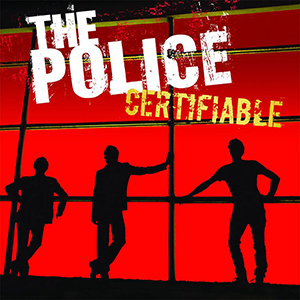 Summers: No, we all do our own projects, but we are absolutely involved, not on an everyday basis, but there’s always The Police business, the brand if you’d like. The band continues on heavily, so we always have to be sort of in touch through various other people, agree on things, and sign off on things, and so on and so forth. It’s more like it’s an ongoing business now that we all have our own separate careers.
Summers: No, we all do our own projects, but we are absolutely involved, not on an everyday basis, but there’s always The Police business, the brand if you’d like. The band continues on heavily, so we always have to be sort of in touch through various other people, agree on things, and sign off on things, and so on and so forth. It’s more like it’s an ongoing business now that we all have our own separate careers.
Before The Police, how would you describe the formative moments as your career was getting off the ground?
Summers: I was a kid coming out of a rural town in England, trying to be the best possible guitar player I could, completely obsessed with it, learning stuff from more advanced players, mostly American, living the life of a musician and trying to be the best possible guitar player I could be.
You went on to working with some pretty significant bands, such as Soft Machine, and even doing some recording with Eric Burdon And The Animals?
Summers: Yeah, I did tour with Soft Machine and I ended up stranded in New York. I made a phone call to a friend of mine, who was playing with Eric at the time, and [he] told me to fly out to L.A. and join The Animals, and I did! Of course, they were very famous and it was a great moment for me. I ended up living with Eric in Laurel Canyon and all that, which was a great, fun time.
Did that almost became a precursor to the fame you would experience?
Summers: I don’t know if I was thinking along those lines exactly, but we did a lot of gigs. I played a lot. I was in the band. I suppose most musicians go out playing and hope that they’re going to be famous someday. I mean, it’s pretty standard. You’re playing and you hope you become famous cause you’re so great. It didn’t happen with The Animals cause that all fell apart. Then I went back to England and life took a different course. But eventually, the rest is history. I did get to that position. In one of those ironic moments, The Police were number one in the world playing stadiums everywhere. Eric and the rest of The Animals came back together years later after they’d broken up. On some of our shows, Police shows, they were the support act and that was a very ironic kind of thing. I’d be going up the ramp to get on the stage to play with The Police to 50,000 people and Eric would be coming [down the ramp], now being the support for it. Life turns. The wheel turns.
What it be fair to say you’re more interested in creativity and less about the notoriety?
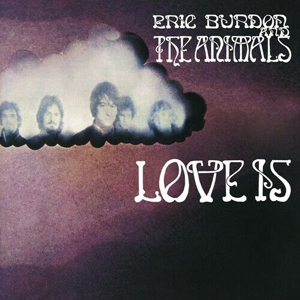 Summers: It’s nice to have all that. I mean, I look at it in very sort of practical terms. I don’t bathe in it and go, “Oh my God. I’m this dude.” I don’t. It provided a great platform to be able to continue on, and have a career, and do stuff, that people pay attention to it. That’s all.
Summers: It’s nice to have all that. I mean, I look at it in very sort of practical terms. I don’t bathe in it and go, “Oh my God. I’m this dude.” I don’t. It provided a great platform to be able to continue on, and have a career, and do stuff, that people pay attention to it. That’s all.
How much do you let outside feedback affect you?
Summers: I think you walk a fine line as an artist. You’ve gotta do your work, and stand by it, and that’s it. If they don’t like it, they don’t like it. I don’t want to be swayed by, necessarily, public opinion. I think you listen to the voice within. I’m sensible. I haven’t gone off the deep end yet, but that’s the most important thing. Otherwise you’re going to be all over the place and you won’t have an artistic path that you’re following. It’s like not bowing to commercial concerns, but seeing if you’ve got something inside yourself that’s worth expressing in whichever particular stage of life that you’re at.
Are there any artists, authors or photographers you’re following these days?
Summers: I’m not overly absorbed and trying to stay on the cutting edge. A similar example would be going on YouTube and looking at all the hot, young guitar players that are out there. When you do that too much, you’re never going to do your own thing, so I’m not that interested in doing that. I’m more interested in my own practice, developing my own thought than trying to keep up with the latest, hot thing cause that’s just a fool’s errand I think. You’ve gotta do your own thing, believe in your own abilities, and mind, and all the rest of it.
What’s your opinion on the music industry now?
Summers: It’s all changed now. I come from an era when we had vinyl LPs and loved it all, big sleeve notes and pages of all that. Now we’re streaming and all that, which is sort of less interesting, but that’s where it’s gone. I don’t know. I don’t really care about the business of music, so much as I try to stay on the art side of it and try to make something worthwhile. The good stuff always comes after the cut-ups, not the business first, which is why I suppose you have managers and people that help you. It’s just a line you have to learn how to walk if you’re a serious artist and you want to make really good work. You’ve gotta stay true to it, not bow to commercial concerns or even wanting to be popular. We all hope to do well. I think I fall somewhere in the middle of all that.
Is there anything left on your list to explore?
Summers: Well, it’s the rest of my life. It just goes on and on. Something comes up, and another idea comes up, and another idea. I’m doing this show right now, which is gonna take up quite a lot of mental space, time, travel and physicality to get through it, but you know, I’m the kind of person that would be doing shows, also carrying my laptop, noting ideas and doing things as we go (laughs). It just never ends, or at least I hope it doesn’t!
Andy Summers performs at the North Shore Center For Performing Arts on Friday, September 8. For additional details, visit AndySummers.com and NorthShoreCenter.org.

